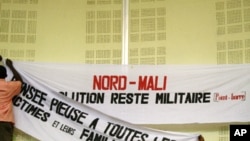Nearly two months into fighting between rebels and the army in northern Mali, citizens are divided on whether the solution is military force or negotiations.
The banner reads: ‘The solution is military, period." It hangs high in a Bamako auditorium where civil groups regularly hold meetings.
Battlefield vs negotiation table
Women gathering for a peace rally insist the banner come down -- not wanting to be associated with the position that military action is the only solution against the latest Tuareg uprising in the north.
Mali has seen several Tuareg rebellions since the 1960s. People are frustrated about yet another wave of instability -- this one triggered when rebels began attacking northern towns in January.
But views differ as to whether the best chance at ending conflict is on the battlefield or at the negotiating table.
Mariam Djibrilla Maïga is president of the group that organized the recent peace forum. She tells VOA the way forward is dialogue, but she understands why some people see military force as the only solution at this point.
She says the people are distraught and no one really wants to see armed attacks on these Tuareg groups.
But, she says, people hear a hard line from the rebels - independence or nothing. This is why part of the population says we must use the military route - even though Maiga thinks the solution is to talk
Yacou Berthé, member of a theatre group who recently played a commander in a skit about going to the front lines, agrees.
He says this conflict cannot end until the parties sit down and talk.
Out of the question, said Djéneba Keïta, president of a veterans association. She echoed the view of many Malians who say the government must use force. Keïta spoke with VOA at her home in the town, Kati - about 15 kilometers from Bamako - which houses a major military base. In February, military families demonstrated in Kati after the reported killing of several soldiers in the north.
She says she wants no more negotiations. Keita says Mali needs a military solution to put things in order. She says enough is enough and that the government should be done with negotiations with the rebels.
Clearly, as many Malians point out, the answer is not going to be cut and dry - one approach or the other. Past rebellions led to both armed conflict and, eventually, talks between the rebels and government.
Hamza Diallo is from Ansongo in Mali’s Gao region. He says the force and negotiation options are not mutually exclusive.
He says this is about using a military response to get to a non-military response, that is, a dialogue.
Seeking social stability
Touré Hamidou is head of an association of people from the north. He says civil society’s principal role is to promote social stability.
He says, it’s not really for civil society to get bogged down in a debate about geopolitical questions and strategy. He says civil society should put its energies toward preserving stability and cohesion among Malian citizens.
The fighting between Tuareg rebels and the army has led to tension and reprisal attacks on the civilian population and some Malians worry, if the conflict drags on, these hostilities will intensify.
Whatever people’s view on the most effective solution, one thing that appears unanimous is fervent support for the Malian armed forces. Almost daily private and public sector organizations present food donations and checks in the thousands of dollars to the defense ministry to help the troops.
News
Malians Divided on How to Tackle Conflict in North




